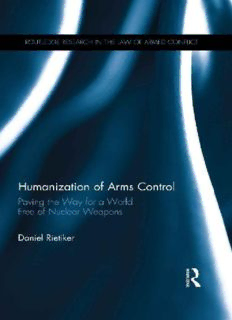Table Of ContentHumanization of Arms Control
Despite clear legal rules and political commitments, no significant progress has
been made in nuclear disarmament for two decades. New ideas and strategies are
therefore necessary. The author explores an alternative approach to arms control
focusing on the human dimension rather than on States’ security:
“humanization” of arms control!
The book explores the preparatory work on arms control treaties and in
particular the role of civil society. It analyzes the positive experiences of the
movements against chemical weapons, anti-personnel mines, and cluster
munitions, as well as the recent conclusion of the Arms Trade Treaty. The author
examines the question of whether civil society will be able to replicate the
success strategies that have been used, in particular, in the field of anti-personnel
mines (Ottawa Convention) and cluster munitions (Oslo Convention) in the
nuclear weapons field. He also explores the contribution of those treaties to the
protection of the human being, and their implementation by NGOs, the European
Court of Human Rights and the International Criminal Court.
The book also explains the effects of weapons, especially nuclear weapons, on
human beings, the environment, and global development, thereby focusing on
vulnerable groups, such as indigenous peoples, women, and children. It takes a
broad approach to human rights, including economic, social, and cultural rights.
The author concludes that the use of nuclear weapons is illegal under
international humanitarian and human rights law and, moreover, constitutes
international crimes under the Rome Statute of the International Criminal Court.
In his general conclusions, the author makes concrete proposals for the
progress toward a world without nuclear weapons.
Daniel Rietiker (PhD) is a senior lawyer at the European Court of Human
Rights and teaches international law and human rights at Suffolk University Law
School (Boston, MA) and Lausanne University (Switzerland).
Routledge Research in the Law of Armed Conflict
Available titles in this series include:
Islamic Law and the Law of Armed Conflict
The Armed Conflict in Pakistan
Niaz Shah
Cluster Munitions and International Law
Disarmament with a Human Face?
Alexander Breitegger
Accountability for Violations of International Humanitarian Law
Essays in Honour of Tim McCormack
Jadranka Petrovic
Humanization of Arms Control
Paving the Way for a World Free of Nuclear Weapons
Daniel Rietiker
Forthcoming titles in this series include:
International Law and Drone Strikes in Pakistan
The Legal and Socio-Political Aspects
Sikander Ahmed Shah
Islam and Warfare
Context and Compatibility with International Law
Onder Bakircioglu
The Concept of Military Objectives in International Law and Targeting
Practice
Agnieszka Jachec-Neale
Cosmopolitan Ethics and Law on Autonomous Weapons in Modern
Warfare
Ozlem Ulgen
Humanization of Arms Control
Paving the Way for a World Free of Nuclear Weapons
Daniel Rietiker
First published 2018
by Routledge
2 Park Square, Milton Park, Abingdon, Oxon OX14 4RN
and by Routledge
711 Third Avenue, New York, NY 10017
Routledge is an imprint of the Taylor & Francis Group, an informa business
© 2018 Daniel Rietiker
The right of Daniel Rietiker to be identified as author of this work has been
asserted by him in accordance with sections 77 and 78 of the Copyright, Designs
and Patents Act 1988.
All rights reserved. No part of this book may be reprinted or reproduced or
utilised in any form or by any electronic, mechanical, or other means, now
known or hereafter invented, including photocopying and recording, or in any
information storage or retrieval system, without permission in writing from the
publishers.
Trademark notice: Product or corporate names may be trademarks or registered
trademarks, and are used only for identification and explanation without intent to
infringe.
British Library Cataloguing in Publication Data
A catalogue record for this book is available from the British Library
Library of Congress Cataloging in Publication Data
Names: Rietiker, Daniel, author.
Title: Humanization of arms control : paving the way for a world free of nuclear
weapons / Daniel Rietiker.
Description: Abingdon, Oxon ; New York, NY : Routledge, 2017. |
Series: Routledge research in the law of armed conflict | Includes bibliographical
references and index.
Identifiers: LCCN 2017002096| ISBN 9781138225428 (hbk) |
ISBN 9781315399706 (ebk)
Subjects: LCSH: Nuclear disarmament. | Nuclear weapons
(International law)
Classification: LCC KZ5665 .R54 2017 | DDC 327.1/747—dc23
LC record available at https://lccn.loc.gov/2017002096
ISBN: 978-1-13822542-8 (hbk)
ISBN: 978-1-31539970-6 (ebk)
Typeset in Galliard
by Keystroke, Neville Lodge, Tettenhall, Wolverhampton
To Yulia, with much love and gratitude for her patience, and to
Wolfgang, our sunshine!
Contents
Table of cases
Abbreviations
Acknowledgements
Foreword
General introduction
PART I
Humanization of arms control treaties dealing with non-nuclear weapons
1 Introductory remarks
A. Scope of Part I
B. Recent developments in the international legal order favoring the
conclusion of the treaties examined in the first Part 8
1. Permeability of the borders between the law applicable in peacetime
and in armed conflict
2. A new approach to international security: “Human security” as a
linkage between security and human rights
3. A new approach to development: “Human development”
2 The preparatory history of the relevant treaties, and in particular the
role played by civil society
A. Genesis of the CWC
B. Genesis of the Ottawa and Oslo Conventions
1. The Ottawa Process
2. The Oslo Process
C. Genesis of the ATT
D. Conclusions to the chapter
3 The contribution of the relevant treaties to the protection of the human
being
Description:Despite clear legal rules and political commitments, no significant progress has been made in nuclear disarmament for two decades. Moreover, not even the use of these weapons has been banned to date. New ideas and strategies are therefore necessary. The author explores an alternative approach to arm

